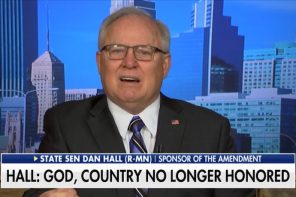The release of new research last month indicating that activists from the religious right and religious left occupy two separate universes prompts me to reflect yet again on the extreme difficulty of attempting to find meaningful common ground positions, except on sky-is-blue issues like opposition to human trafficking and state-sponsored torture.
There are occasions in life in which polarization simply means that the opposing parties should try harder to forge common positions. This is not one of them. An inconvenient truth here is that religious conservatives often sacralize their positions in ways that make them immune to compromise, whereas many religious liberals are only too willing to yield on their positions. This makes for an unstable mix (or, in biblical terms, an unequal yoking) in which conservative positions steadily gain ground, issue after issue.
Health care reform provides a good case in point. A significant part of the conservative community is determined to insert a hard prohibition on federal abortion funding into the final reform legislation—a provision that will remove existing access to abortion services from the insurance plans of millions of women. Conservatives unhesitatingly frame this as an issue of fundamental conscience. In response, many good liberals bite their tongues and go along for the sake of the supposed greater good of achieving universal coverage.
The silencing of a progressive religious voice for the sake of creating an imaginary common ground is also evident in the informal agreement to remove entire issues—marriage equality, for example—from the table. Whereas abortion can be admitted to the conversation on the right’s terms, equal rights for sexual minorities cannot be admitted at all. The religious right’s position, “we’re not even going to discuss this,” becomes tacitly accepted by everyone else.
It wasn’t supposed to work this way. Four and a half years ago, after the religious right’s pivotal role in reelecting George W. Bush spurred a frenzy of anguished discussion and planning among progressive religious leaders, the operative rationale for building new “open source” structures was that progressives would slowly domesticate the conservatives; tempering their rhetoric if not actually winning them over to more moderate positions. But there is scant evidence that anything like this has happened. What has happened instead amounts to moving the goalpost rightward: some notably sex-phobic evangelical and Roman Catholic individuals and entities have been rebranded as the progressive forces watch, while actual progressives (solidly feminist and pro-LGBTQ religious leaders) have disappeared from view.
The silencing of the religious left is so effective that even to call attention to the rebranding process is to make oneself persona non grata. Some colleagues have dressed me down both publicly and privately on more than one occasion for pointing out that certain men with long histories of indifference or hostility to the concerns of women and gays should not be lifted up as exemplars of progressive religious leadership.
In seeking to understand why rubrics like “dialogue” and “search for common ground” are wildly inappropriate for what actually happens when religious liberals and religious conservatives engage one another, it helps to bear in mind what has been going on among American conservatives generally. According to the always-astute Neal Gabler, the conservative movement as a whole has been subject to “religification” over the past 30 years to the point that American conservatism is no longer really about politics, with all of the “limitations, hedges, and forbearances” that a healthy politics implies.
As Gabler writes:
You cannot beat religion with politics, which is why the extreme right “wins” so many battles. The fundamentalist political fanatics will always be more zealous than mainstream conservatives or liberals. They will always be louder, more adamant, more aggrieved, more threatening, more willing to do anything to win. Losing is inconceivable. For them, every battle is a crusade—or a jihad—a matter of good and evil.
Gabler correctly views the extreme polarization of national political life as an extension of the polarization that characterizes our religious life. Why, then, should anyone expect conservative religious types to be interested in forming any kind of common ground with moderates or liberals on difficult issues? They have nothing to gain, and everything to lose in admitting that others might also have a conscience; or that there might be something godly in the liberal insistence that women’s capacity for moral discernment is equal to that of men.
The way religious conservatives punish those of their own who deviate from the Righteous Path should tell us everything we need to know about a cast of mind that has no interest in “dialogue.” I have heard the anguished stories of more than one Evangelical leader who was put out of the fold—and whose illusions about Christian love and forbearance were shattered—when they began to show signs of thinking for themselves.
With joblessness and foreclosures continuing to surge, conservative religion can be expected to cement its hold on millions more of our fellow citizens over the next few years. The Christian Right is also clearly reverting to its racialist roots after a brief show of pretending to care about racial reconciliation.
These people are not content merely to occupy the right: they also intimidate and police what there is of the religious middle. Which is why I maintain that liberals make nice to them at their own peril. They, and those whom they are able to intimidate, are not operating in the same psychological/spiritual space as we are. We believe we are struggling toward the light; they believe they already have all the light they need. We seek a place at the table for everyone; they claim to know who is worthy and who is not worthy to be invited. We cringe to see the civil state colonized by religion; they have no hesitation at all about using the civil state to advance a sectarian agenda. It seems to me that the only common ground here is a killing ground for democratic aspiration.




